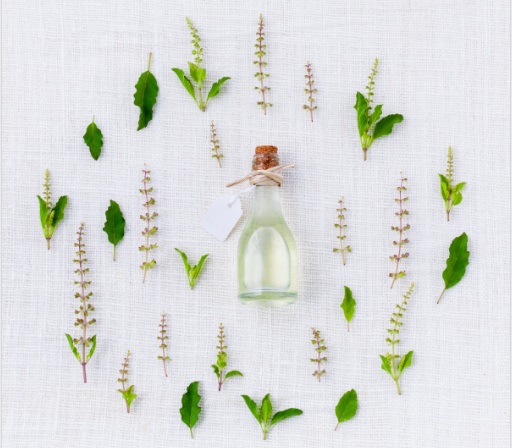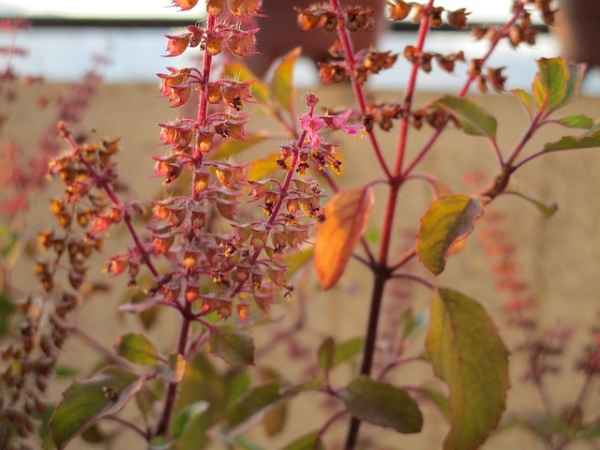Tulsi, Basil, or Holy Basil, a magical plant that nature has given to us. There are a number of benefits of Tulsi plant leaves and their uses for our health. It is an aromatic plant that comes from the family Lamiaceae.
Majorly found in the Indian subcontinent and throughout the Southeast Asian tropics. The botanical name or scientific name of the Tulsi plant is Ocimum tenuiflorum. The name of Tulsi in English is Basil.
Tulsi plant in Hinduism is considered as a holy plant and is worshipped majorly pan Indian subcontinent. The name of Tulsi in English is also termed as Holy Basil.
Tulsi Plant has multiple miraculous uses too. A festival Tulsi Vivah is celebrated in many parts of India showing the significance of the Tulsi Plant (Holy Basil).
Knowing the medicinal uses and benefits of Tulsi Plant leaves in various forms, we show our devotion to this magical herb by celebrating Tulsi Vivah. There are many so many benefits of tulsi plants :-
Before proceeding further, following are some Tulsi Plant Products you may like to procure:
- Organic India Classic Tulsi Green Tea
- Rustic Art Organic Neem Basil Face Wash Concentrate for Deep Cleansing – Anti-Bacterial, Anti-Fungal
- Naturalis Essence of Nature Holy Basil Essential Oil 100% Pure, Natural & Undiluted Therapeutic Grade for Perfect For Cough, Colds, Clear Breathing, Pain, Mosquito Repellent, Aromatherapy, Relaxation
- Khadi Natural Neem Tulsi Herbal Face Pack
- Organic India the Tulsi Original
- Emeveta Herbal Organic Pure Panch Tulsi Ark Drops Immunity Booster
- Kapiva Wild Tulsi Giloy Juice – Natural Juice for Building Immunity – First brand to use Neem Grown Giloy Stems with Fresh Tulsi Leaves – No Added Sugar
- Himalaya Wellness Pure Herbs Tulsi Respiratory Wellness
Benefits of Tulsi Plant Leaves Which We Should Know
So here I am going to throw light on various ways where the Tulsi plant enlightens our health, mind, and body.
1. Benefits of Tulsi Plant Leave – A Medical herb:
The first and top use of the Tulsi plant would be as a herb. This holy plant is vastly used and practiced in Ayurveda. Tulsi plant is considered as an adaptogenic herb, a plant that helps to adapt the body to stress and boost energy. And Tulsi plant is majorly used as a Medical herb due to its antioxidant, anti-inflammatory, and anti-aging properties. Tulsi plant also has pain-relieving properties because it contains eugenol. Such a number of benefits of Tulsi plant leaves and its uses, simply make it favorite of all indoor plants. Relieving anxiety, controlling cholesterol, and metabolic syndrome are some other Medical benefits of the Tulsi Plant.

a) Which diseases are cured by Tulsi Plant Leaves?
Leprosy:
10-20 ml of Tulsi Plant Leaves extract daily use in the morning can cure leprosy in a large extent. Tulsi Plant Leaves paste in lemon juice on eczema, leprosy, and other such diseases can also be cured significantly.
Anxiety:
As an adaptogen, Tulsi Plant Leaves may relieve anxiety and helps in refreshing moods and provides the Benefits of Tulsi Plant Leaves.
High Cholesterol:
Tulsi Plant Leaves may help to limit cholesterol levels.
Respiratory Infections:
The use of Tulsi Plant Leaves helps in fighting bacteria/viruses that cause pneumonia and urinary tract infections.
Kidney Stone:
Tulsi Plant Leaves have a positive effect on the kidney. In the case of stone, regularly taking Tulsi Plant Leaves juice and honey helps in releasing the stones via the urinary tract.
Stress:
Tulsi Plant Leaves are considered anti-stress agents. One can simply chew Tulsi Plant Leaves to prevent stress. It also helps in purifying the blood.
For curing diabetes:
It is sometimes used to regulate diabetes by using Tulsi water early in the morning after keeping Tulsi root powder in water overnight.
b) Some common home made medicinal use of Tulsi Plant Leaves
Headaches:
A common use of Tulsi Plant Leaves is it act as good medicine for headaches. The of Tulsi Plant Leaves of Tulsi Plant Leaves can be gained through drinking green tulsi tea, etc.
Home Remedy for Cough:
One of the most common uses in almost every home is taking benefit of the Tulsi plant for curing cough and cold.
Support in Digestion:
Tulsi Plant Leaves act as an appetizer and improves metabolism by helping in the discharge of digestive enzymes.

2. Benefits of Tulsi Plant Leave for Skin and Body
a) Used as skincare herb/oil:
The essential oil of Tulsi cleanses the skin from within. Tulsi Plant essential oil is beneficial for oily skin. It removes dirt and impurities that block pores. Anti-inflammatory and anti-microbial properties of Tulsi Plant help in curing acne/pimple development. It is one of the benefits of Tulsi plant leaves and its uses. The essential oil of the Tulsi Plant also slows down the skin aging due to its Anti-aging properties.
b) Can we apply Tulsi on the face?
We sometimes have this question in our mind, so, the answer is, to get glowing skin we can apply the mixture of Tulsi plant leaves and sandalwood powder which can help in minimizing the acne/pimple and its marks.
c) Does Tulsi help in reducing weight?
Metabolism plays a vital role when we talk about weight loss or removing extra fat from the belly. Tulsi helps in increasing metabolism and improves the fat burning process. It also helps the body to suitably absorb essential nutrients that we are eating, which benefits you stay fit, strong, energetic, and healthy. Benefits of Tulsi Plant Leaves are counless, suh as taking Tulsi tea or Holy Basil leaves boosts to lose belly quickly. Another strong benefit is that Tulsi increases immunity.
3. Tulsi Plant Medicinal Uses
Used as a wound healing booster:
Many of us wouldn’t be knowing this that Tulsi has excellent wound healing properties and Tulsi boosts the wound healing process. This shows the Benefits of Tulsi Plant Leaves and its medicinal uses.
Benefits of Tulsi Plant Leaves on Eating them Empty Stomach
When an empty stomach in the morning is served with two or three fresh leaves of Tulsi Plant, it is the best thing your stomach getting as the first diet. It flushes out toxins and does the cleaning of the internal body system. It is also very effective in treating the common cold. Another way of taking it is to soak these leaves and then consume it. These are some proofs of Tulsi Plant medicinal uses.
4. Uses of Tulsi Plant Leave – As a Beverage
Tulsi Organic Green Tea:
In many parts of southeast Asian countries and majorly in India Tulsi is used to prepare beverages such as herbal tea, green tea, and in Many cold beverages too. As a beverage Tulsi also reduces anxiety and stress. These are the some best ways to get Benefits of Tulsi Plant Leaves.
How to prepare Tulsi water and when should we drink it?
To prepare one glass Tulsi water five to six Tulsi Plant leaves are sufficient enough. However, one can increase or decrease based on his requirement to make it lighter or stronger. Water can be boiled with leaves or one can simply dip leaves in boiled hot water for 10 to 15 minutes. It can be served warm or cool both forms.
Simply sipping Tulsi Water at different times (two to three) during the day can treat acidity problems. Drinking a glass of Tulsi water early in the morning at an empty stomach will make you feel full of an energetic whole day.
5. Is Tulsi good for hair growth?
Used in hair care:
Yes Tulsi prevents hair loss and greying of hair. Tulsi paste has hydration properties so it moisturizes your hair that eliminates itching and dandruff too.
Does holy Basil (Tulsi) cause hair loss?
Holy Basil can be used for hair in many ways which is helpful in preventing hair fall; Tulsi can protect hairs from becoming greying. The Tulsi Oil gives nourishment to thinning hair follicles, and as a result it plays the role of the healer or you can say stimulant.
6. Tulsi Plant importance in Hinduism
Tulsi plant in Hinduism has a very old relationship. From festivals to daily worships, it has an important role. Tulsi is considered as a holy plant and is worshipped majorly pan Indian subcontinent (name of Tulsi in English is known as Holy Basil whereas botanical name or scientific name of Tulsi plant is Ocimum tenuiflorum). The benefits of Tulsi plant leaves and its uses creates its huge importance in our life.
Tulsi Vivah
A festival dedicated to Tulsi Plant because of its importance is celebrated. This festival is known as Tulsi Vivah. This Tulsi Vivah is celebrated anytime between Prabodhini Ekadashi (the eleventh or twelfth lunar day of the bright fortnight of the Hindu month of Kartik) and Kartik Poornima. During the Tulsi Vivah and other related worship of Vishnu and his avatars, Tulsi Plant Leaves which has many benefits and medicinal uses are part of the worship. Tulsi Plant Leaves are used during the worship of god Krishna and Rama, and other males Vaishnava deities, such as Hanuman and some also other deities.

Celebration of Tulsi Vivah – Rangoli, Geet, Mangalashtak
Tulsi Vivah is the ceremonial marriage of the Tulsi (holy basil) to the Hindu god Vishnu or Shaligram or to his avatar Krishna. People celebrating this festival knows how to decorate Tulsi for Tulsi Vivah. During celebrations Tulsi Vivah Rangoli is made and Tulsi Vivah Mangalashtak geet or aarti or mantra is chanted. The Tulsi Vivah indicates the beginning of the wedding season in Hinduism. Also, it signifies that there is an end of the monsoon season. We know the medicinal uses and benefits of Tulsi plant leaves and to show our devotions to this magical herb we celebrate Tulsi Vivah.
Can ladies pluck Tulsi Plant leaves?
In Hinduism, it is a belief in many families that women should not pluck Tulsi Plant leaves. The reasons are some spiritual and have various stories behind the prohibition of plucking Tulsi Plant leaves by women. This demonstrates when you have a great faith due to Benefits of Tulsi Plant Leaves and its use in our life.
Can Tulsi Plant be grown indoors?
Yes, Tulsi plants can be grown indoors as it does not have big size. And the requirement for its growth can be easily taken care of inside our house. There are many Benefits of Tulsi Plant Leaves which becomes easily available in home. Tulsi plants can be grown indoors by using seeds, or you can buy indoor plants online.
When should Tulsi Plant leaves not be plucked?
There are many beliefs on the plucking of Tulsi Plant leaves in Hinduism. It is said that it is not right to pluck anything from any plant at the time of night and evening. In the case of Tulsi Plant it is followed to avoid plucking leaves on Dwadashi, Purnima, Amavasya, Sunday. Also, it is not a good thing to pluck the leaves singly, if someone has to pluck then pluck them in pairs (two or three).
7. The Botanical Name of Tulsi Plant or Scientific Name of Tulsi Plant
There Are Various Types of Tulsi Plant
(Tulsi in English is called Holy Basil.)
Tulsi Plant (Holy BASIL) a SUPER HERB!
Types of Tulsi plant (holy BASIL)
Tulsi Plant is one of the most consumed herbs, it has a significant number of species identified (around 60). Considering the benefits of Tulsi Plant leaves and its uses, it has a variety of different types or we can say species.
The widely used varieties can be categorized into two groups based on the botanical name of Tulsi Plant or the scientific name of Tulsi Plant, one is Holy Basil (Ocimum sanctum) and another one is Mediterranean Basil (Ocimum Basilicum).
A) HOLY BASIL
In India Holy Basil Plant is known as Tulsi and in Hinduism it is worshiped as it has more medicinal properties corresponded to other group species. In view of Benefits of Tulsi Plant Leaves and it uses these have same are some category
The popular 4 species of Holy Basil/Tulsi with the botanical name or scientific name are:
- Rama Tulsi
The botanical name or scientific name is Ocimum sanctum.
- Krishna Tulsi
The botanical name or scientific name is Ocimum tenuiflorum.
- Amrita Tulsi
The botanical name or scientific name is Ocimum tenuiflorum.
- Vana Tulsi
The botanical name or scientific name is Ocimum gratissum
B) MEDITERRANEAN BASIL
Recognized as Sweet Basil and found all over the world which makes it most consumed due to significant Benefits of Tulsi Plant Leaves. The remaining of species of Holy Basil/Tulsi with the botanical name or scientific name are:
- Thai Basil (Ocimum thyrsiflora)
- Sweet Basil (Ocimum Basilicum)
- Purple Basil (Ocimum Basilicum)
- Lemon Basil (Ocimum citriodorum)
- Vietnamese Basil (Ocimum cinnamon)
- American Basil (Ocimum americanum)
- African Blue Basil (Ocimum kilimandscharicum)
- Italian Genovese Basil (Ocimum Basilicum)
Some other species of Holy Basil/Tulsi with the botanical name or scientific name are:
- Lettuce Basil
- Green ruffles Basil
- Cardinal Basil
- Greek Basil
- Spicy Globe Basil
- Summerlong Basil
A Natural Cure of Many Diseases – Ultimate Benefits of Tulsi Plant Leaves
It is a good habit to have two to three Tulsi Plant leaves in a day in any way to get benefits of Tulsi plant leaves. Whenever tea is prepared one can add Tulsi Plant leaves and enjoy strong Tulsi tea in a day.
It is to make it clear that Tulsi Plant and Holy Basil are the same. And Tulsi Plant is a super herb.
Which acts as an antiviral, anti-inflammatory, can be used on the face as well. It helps in hair growth and reduces hair fall. Tulsi has shown a positive impact on the lungs and is also used when there is a problem of bronchitis. Many people take Tulsi water, which is a good way of taking Tulsi in our body. Tulsi or you can say holy Basil can be taken at any time at night or morning, but the best practice is when Tulsi is taken in the morning.
Why the Tulsi Plant is called ‘Queen of Herbs’?
There are many benefits of Tulsi plant leaves and the list can be unending. In India Holy Tulsi Plant is worshipped and planted in almost every Home. Tulsi Plant in the home is planted to create positive surroundings and environment, many uses Tulsi in food recipes.
Tulsi Plant is used in many ways in various forms like Tulsi ark, Tulsi juice, Tulsi oil, Tulsi powder, Tulsi Plant Leaves, Tulsi cough syrup, Tulsi drops, Tulsi organic green tea and has huge health benefits. This shows how much a Tulsi Plant has importance in our life. So, you can surely say this is the reason why the holy Tulsi Plant is called ‘Queen of Herbs’.
Final Wordings
So above I just wrote information (source) on some top benefits of Tulsi plant leaves and its uses on our health system. But often, we have doubt, Does Holy Basil (Tulsi Plant) have side effects? So, in general, it helps vigorously when taken every day in a balanced way or until you think it is not adversely affecting your system.
Seeing, a number of benefits of Tulsi plant leaves and its uses, I think everyone should have this magical plant or you can say Queen of Herbs in our sweet home.
So, How do you use the Tulsi plant, and what are your favourite uses of Tulsi Plant (Holy Basil)? Let us know in the comments.









nice article..
Very informative…. Thanks for explaining in simple words….
Good information…